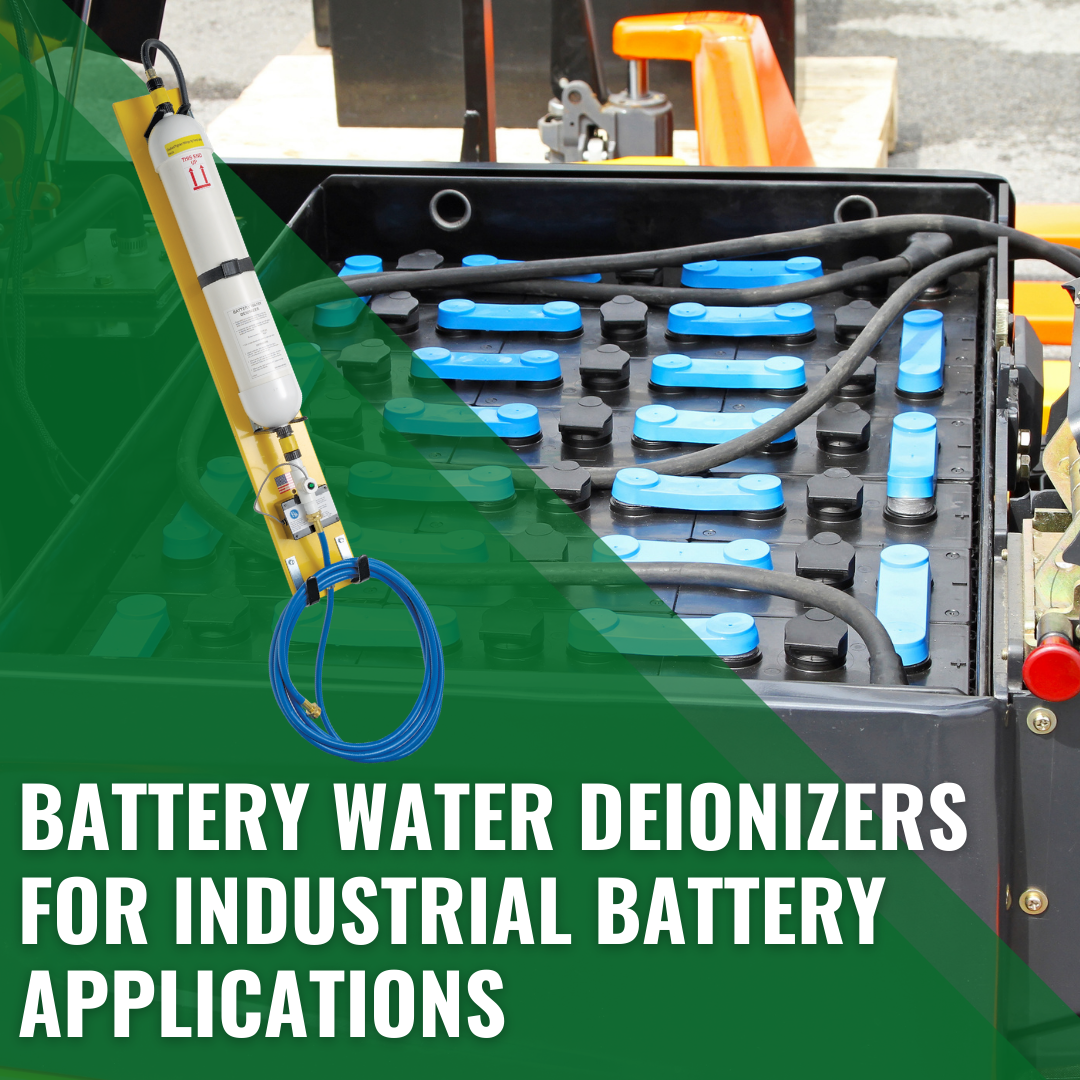We use cookies to make your experience better. To comply with the new e-Privacy directive, we need to ask for your consent to set the cookies. Learn more.
Battery Water Deionizers for Industrial Battery Applications
Battery watering is a critical part of lift truck maintenance. When batteries aren’t watered regularly, they can lose a significant portion of their capacity — we’ve explained why this occurs in other articles, but the takeaway is clear: Regular watering solves the problem, which is why every battery room needs to incorporate fluid checks into regular maintenance schedules.

And while watering batteries is crucial, personnel also need to use the right process to prevent batteries from degrading over time. Tap water contains minerals that can disrupt a lead-acid battery’s electrolyte mixture. Over time, these minerals can limit the battery’s operating life, leading to early replacement. Minerals can also cause corrosion, which weakens the battery’s case and puts staff at risk.
Operators should only use deionized or distilled water in forklift batteries. Of these options, deionized water is the better choice, since the deionization process removes all of the ions from the water, preventing it from conducting much electricity.
There’s another factor to consider, and it’s a significant one: Distilled and deionized water is often expensive, particularly when purchased in bottles or barrels. For most operations, the solution is to deionize water onsite, cutting the cost of battery maintenance while ensuring a consistent supply of clean water.
Looking for a steady, low-cost supply of deionized water in your battery room? Install a Water Deionizing System.
Why Battery Water Deionizers Are a Cost-Effective Solution
Battery water deionizers connect straight to the tap. As water flows through the system, cationic (positively charged) and anionic (negatively charged) resins eliminate impurities. In other words, these systems don’t simply run water through a filter — they dissolve impurities through an electrostatic process. They’re dependable, effective, and relatively inexpensive.
Products like the BHS WDS-1 Water Deionizing System use cartridges that provide up to 600 gallons of purified water. The math is fairly simple: Municipal tap water costs around $0.004 per gallon on average, with some cities charging much less. Lab-grade deionized or distilled water can cost up to $0.27 per gallon when accounting for delivery fees and other expenses. Eventually, onsite deionizers offer a return on investment, particularly for operations that currently depend on bottled water.
The system also ensures a consistent physical access point for battery watering tasks, which can be helpful in some battery rooms. Of course, deionized water from the system can be used to fill battery watering carts when the building’s water source isn’t directly accessible from the battery room.
Choosing a Battery Water Deionizer for Lift Truck Battery Maintenance
Products like the WDS-1 can significantly improve lead-acid battery life by providing consistent access to an appropriate water source. Managers should consider several questions when evaluating deionization systems:
Can the deionizer operate at full-line pressure? The WDS-1 operates at up to 80 psi, ensuring efficiency without sacrificing water quality. The system does not require AC power, so installation is straightforward in the vast majority of battery rooms.
Does the battery deionizer have visual indicators for its filter cartridges? High-quality deionizing systems have indicators that show when the cartridge needs to be replaced. Look for products that offer quick, tool-free cartridge replacement to ensure that personnel use the system as intended.
How is the water dispensed? Ergonomics should always be a consideration for employers. The WDS-1 is compatible with the WG-X Watering Gun, a lightweight tool with an automatic shutoff and an ergonomic design. The non-electric automatic shutoff mechanism makes battery watering more convenient while limiting the chances of overwatering. When used with an appropriate water source, it allows staff to work quickly while ensuring longer lifespans for batteries.v
The effects of low-quality water may not be noticeable at first, but forklift batteries are expensive components — proper maintenance is absolutely essential for keeping expenses down and keeping lift trucks moving. Deionizing systems make key maintenance much simpler, and they’re a worthwhile investment for operations of all sizes.
Problems with spills and overfilling while watering forklift batteries? Battery Watering Devices can help. Find them here.
